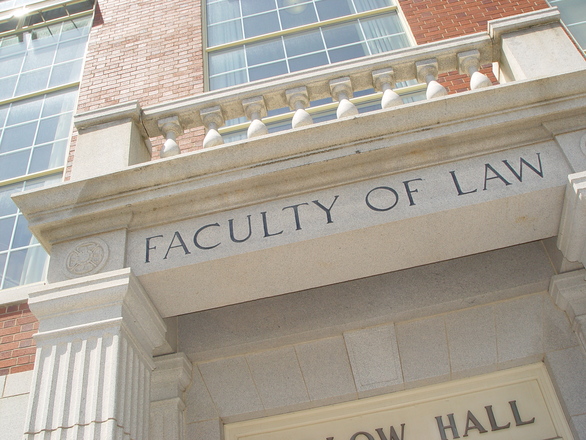Guest blog by Lidia Imbrogno, NSRLP research assistant and 2L, Windsor Law
Depending on whom you ask, “Access to Justice” can mean different things. When I first came across this term a few years ago, I thought that it sounded like a term for victims seeking retributive action, or perhaps a synonym for human rights.
As a law school applicant and later a 1L at Windsor Law, the meaning of Access to Justice began to take shape for me. But it wasn’t until I began working with the National Self-Represented Litigants Project that the words fused together to create a picture of what I believe is one of the most serious and often ignored issues facing the legal community.
The majority of Canadians cannot afford a lawyer.
Windsor Law’s Dr. Julie Macfarlane published a report in 2013 that documented the real-life experiences of hundreds of self-represented litigants, or SRLs, in three Canadian provinces. This groundbreaking study not only brought the topic of lawyer unaffordability to the surface, but also outlined a number of common misconceptions about SRLs. For example, both inside and outside the legal community, many people think that:
- SRLs have higher rates of mental illness
- SRLs are irrational, angry, and difficult to work with
- SRLs chose to represent themselves because they think that they can do a better job than a lawyer
Dr. Macfarlane’s research debunked these myths. Most importantly, the research confirmed that for the most part, people self-represent because they cannot afford a lawyer, not because they do not think they need one.
Dr. Macfarlane’s painfully accurate research results detail a problem facing other

countries as well. In June 2016, the Institute for the Advancement of the American Legal System (based at the University of Denver) published their research report on self-represented litigants in four US states. Their findings mirrored Dr. Macfarlane’s research in almost every way. Most importantly, the US report confirmed that the majority of SRLs self-represent because they have no other resources. As a result, SRLs are left feeling confused, isolated, and vulnerable throughout the legal process. In the end, self-representation adds substantial stress and anxiety to an already emotionally demanding time.
Why Do People Represent Themselves?
For me, the biggest takeaway from the research was that the majority of SRLs do not want to be representing themselves in court. But there is an ever-widening gap between those who qualify for legal aid, and those who can actually afford a lawyer for any extended period. And the result is an absence of Access to Justice – in any real and meaningful way – for these individuals.
There is a widespread misconception that the majority of those who self-represent do so by choice. The reality is that the rise in SRLs is hardly a result of an overconfident group of “do-it-yourself-ers”. Both the Canadian and the US research show that any confidence SRLs began with has usually drained away once they get partway through their matter.
Who Is Affected By This?
This is a problem that affects the vast majority of Canadians. Public legal aid sets extremely low-income thresholds for those seeking assistance. I would challenge anyone who does not think that our Access to Justice crisis will not affect them to look up their provincial legal aid threshold, and then check out the legal fees associated with their hypothetical problem. The gap between those who are publicly subsidized and those who can afford full representation by a lawyer is well illustrated by the 53% of the Canadian study’s sample who had been represented by counsel earlier in their action, but having run out of funds, were now representing themselves.
What Is It Like To Be A SRL?
From the outset, SRLs face challenges. Have you ever tried filling out a form written in another language? What if you knew that this form was going to play a part in whether or not you would be able to gain spousal support? Or see your children? Many of those who can provide help to SRLs in the courthouse are restricted to providing legal information. Imagine going to the doctor with a serious illness and telling them what’s wrong and what you need. What if the doctor could only give you information – but not offer advice or a solution?
SRLs face many obstacles in navigating the legal system, but their stress doesn’t end there. The stress of being a SRL affects people’s physical and mental health, and the effects may continue long afterward. Ailments include sleep disorders, headaches, weight loss, and depression. Many of these symptoms are in line with those displayed in cases of post-traumatic stress disorder.
Many SRLs describe their cases as taking over their lives, proving to be far more time-consuming than they ever imagined. SRLs describe becoming alienated from friends and family, for at times they had difficulty thinking or talking about anything else other than their case.
Many SRLs describe especially high levels of stress and anxiety associated with court appearances. Unfortunately, some also report that they are met with negative treatment by judges and opposing counsel.
Sadly, for some SRLs the cumulative result of the self-representation experience is a profound loss of faith in the justice system. This loss of faith is the surest sign that something must be done.
What Is the “Solution”?
There is no single solution to this problem – as we often say at NSRLP, this is a “system” problem with many elements. But there are countless individuals and organizations attempting to close the Access to Justice gap, and all these initiatives are important in pushing forward the necessary adjustments in the system. For example, some lawyers are working to make legal representation more affordable and accessible by offering unbundled legal services, coaching, and fixed fee services. Legal Aid Boards are starting to look at ways to use their limited resources more effectively to help more people. Ontario is considering allowing paralegals to take on family law cases. And organizations like the National SRL Support Network offer SRLs emotional support, and referrals to trusted information and resources for each province.
How Can You Help?
Law Students
- Become involved in A2J organizations and initiatives in your school; for example, ProBono Students Canada is rolling out a law student/ SRL “coaching” program this coming year based on the Windsor model.
- Check out “Bring a SRL to School Day” which took place last academic year at three Ontario law schools. We hope to expand this program in 2017.
- Keep the dialogue going – ask your profs for speakers on A2J topics, and keep the conversation going when you move into practice.
Lawyers
- Become educated on flat rate and unbundled services. Services such as these greatly improve access for those who cannot afford full representation.
- If you offer unbundled or limited scope retainer services, join our Professionals Assisting SRLs Database to make your services known.
- Consider working with paralegals who can offer some client services at a more affordable rate.
- Above all, always treat SRLs on the opposing side with respect and dignity. Remember, they do not want to be there advocating for themselves alone.
Professional Leaders: Law Societies and Judges
- A recent NSRLP survey showed that lawyers would be far more likely to offer unbundled services if there were more support and explicit endorsement of these service models by their provincial law societies and Bench.
- The Bench can signal their strong support for limited representation models that enable SRLs to be more functional and effective when appearing in court.
- Law Societies can do more to promote education and information about unbundling, limited scope retainers, and coaching. They can also consider offering the public access to lawyers who offer these types of services via Lawyer Referral Services.
The Access to Justice movement challenges those who work inside the legal system to approach every decision with the mindset that everyone deserves their day in court. Whether we are lawyers, court staff, law students, law societies, judges, or paralegals, we share a moral obligation to ensure that the chain reaction of our practice and our decisions helps to bridge gaps in Access to Justice, rather than continue to widen them.

Read this article posted on the SSRN:
“Access to Justice-Unaffordable Legal Services’ Concepts and Solutions”
at: http://ssrn.com/abstract=2811627
It explains the problem’s true nature and how to solve it. All “alternative legal services” such as the NSRLP, do not try to solve the problem, but only to help the population learn to live with the problem. Taxpayers who pay for the justice system deserve better than that. But they must settle for the charity that is alternative legal services. That is galling, insulting, and undignified for taxpayers to have to pay for a justice system for lawyers to earn a better living than they do, but the legal profession is making no effort to provide an affordable lawyer who is “their lawyer.” That’s what people want and deserve.
The Law Society’s failure to try to solve the problem is an intentional refusal to perform its duties under the Law Society Act, s. 4.2. As a result, law societies cause more damage to society than does any other group of people or institution.
Their answer is alternative legal services which is a declaration to middle income people that never again will they have a lawyer who will do all of the work arising from their legal problems, in a fiduciary relationship, at an affordable price. And it is a confession of their inability to solve the problem because they refuse to try to solve the problem. As the victims of the problem grow bigger and more numerous, law societies invite their own abolition.
Because lawyers do not pressure their law societies to try to solve the problem, they appear to be willing victims of the problem and of law society intentional incompetence.
Alternative legal services will always be needed, but they should not be the law societies’ only answer to the problem.
The NSRLP is a very commendable project, but it is also in the Project’s self-interest that the problem never be solved, and that its victims remain as large in number and kind. It and other alternative legal services are providing the law societies with an excuse to never try to solve the problem. That serves the self-interest of benchers to never have to provide the time and provide the trial-and-error work necessary for learning how to solve the problem.
It is a law society-caused problem, capable of a law society created solution. CanLII and the mobility agreement are impressive accomplishments of the law societies. They prove that the law societies can solve the problem.
What are your replies to the article?